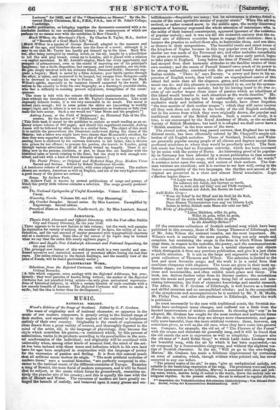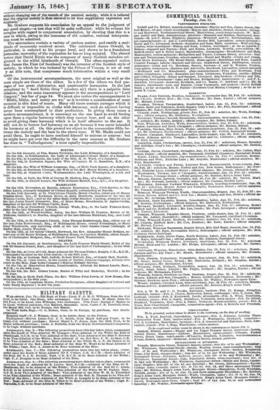MUSIC.
NATIONAL MELODY.
Wood's Edition of the Songs of Scotland. Edited by G. F. Graham.
The want of originality and of national character, so apparent in the music of our modern composers, is greatly owing to the limited range of their studies, and especially to their neglect of the national or indigenous melody of their own country. Originality is the result of copiousness of. ideas drawn from a great variety of sources, and thoroughly digested in the mind of the artist, till, in the language of physiology, they become the chyle which nourishes his genius,—a nutriment which, by this process of assimilation, varies in its products according to the peculiarities in the men- tal conformation of the individual: and originality will be combined with nationality when, among other kinds of musical food, the mind of the art- ist has been imbued with those tones and inflexions which in his own land have for ages been employed in conjunction with the language of poetry for the expression of passion and feeling. It is from this natural music that all artificial music derives its origin. " The most artificial melodies of modern times," says a musical historian, "are perfectly congenial in cha- racter to the national music of the different countries of Europe. Examine a song of Rossini, the most florid of modern composers, and it will be found that its subject, or the strain which forms its groundwork, resembles en- tirely the popular airs of his country; and this is equally the case with the airs of Mozart and Weber. The resources of modern art have greatly en- larged the bounds of melody, and bestowed upon it many graces and em- bellishments—frequently too many; but its substratum is always fbund to consist of the most agreeable strains of popular music." When the art was revived, or rather created anew, in the middle ages, the newly discovered resources of harmony engrossed the whole attention of musicians; who, in the midst of their learned counterpoint, appeared ignorant of the existence of popular melody; and it was not till the sixteenth century that the na- tional airs of different countries began to engage their attention: then it became the practice to collect those airs, to harmonize them, and use them as themes in their compositions. The beautiful rustic and street tunes of the kingdom of Naples became in this way popular over all Europe; and similar use was made of the Provencal airs, and other melodies remarkable for grace or expression. The same thing, at the same early period, began to take place in England. Long before the time of Purcell, our musicians had stooped from their harmonic altitudes to the familiar strains of their own country; and the music of Purcell himself owes much of its power to its strong nationality, combined with the grace and beauty derived from Italian models. " There is," says Burney, "a power and force in his ex- pression of English words, that will make an unprejudiced native of this island feel more than all the elegance, grace, and refinement of modern music can do: and this pleasure is communicated to us, not by the symme- try or rhythm of modern melody, hilt by his having tuned to the true ac- cents of our mother tongue those notes of passion which an inhabitant of this island would breathe in such situations as the words describe." Mo- dern English music has quite lost its nationality: our composers, in their exclusive study and imitation of foreign models, have clean forgotten "the true accents of their mother tongue "; which they will never recover till they seek them not alone in the works of the old English melodists, but in the source from which they were originally drawn, the popular and traditional strains of the British islands. Such a course of study, it is true, is not encouraged by the Royal Academy of Music, or the so-called Society of British Musicians; but until it is adopted we shall never have a "British musician" in the true sense of the term.
The absurd notion, which long passed current, that England has no-tra- ditional music, has been effectually refuted by Mr. Chappell's ample col- lection of old English melodies. Those of Scotland, Ireland, and Wales are generally popular among people of all classes and degrees except those professed musicians to whom they would be peculiarly useful. The Soot- tish music has long had an European celebrity, which has been increased by its union with the poetry of Burns. An interesting proof of its popular- ity in Germany has been afforded by a recent publication in that country —a collection of Scottish songs, with a German translation of the words.* It contains notes upon the songs, and notices of their authors. The Ger- man versions are excellent; and it is curious to see how well, owing to the Saxon consanguinity of the two languages, the rhythm and accent of the original are preserved in a close and almost literal translation. Louie o'Buchan begins thus— "O Logie von Buchan, o Logic der Laird!
Du nahmest mir Jakob, den Gartner so werth,
Der so wohl sich auf Geig' and auf Pfeife verstand, Da nahmest mir Jakob, den Besten IM Land."
Auld Robin Gray- " Wenn die Scher in der Hind' and im Stall ist die Kulr, Wenn all' die mode welt begeben sich zur Ruh, Dann fliessen Thrinenstriime vom Rug: vor bitterm Leid, Indess in fiefem Schlafe mein Mann mir ruht zur Seit."
The Birks of Aberfeldy- " Liebes Mhdchen, willst da gehn,
Willst du gehn, willst du getin
Liebes Madchen, willst du ge In die Aberfeldy-Birken?"
Of the numerous collections of Scottish national song which have bean published in this country, those of Mr. George Thomson of Edinburgh,aml. of Mr. John Wilson the eminent vocalist, are the most important. Mr. Wilson's work is naturally the more popular, being not only ample and complete, but containing the songs in the form in which Wilson himself sings them, in respect to the melodies, the poetry, and the accompaniments. The new collection now before us has a special character and objects which distinguish it from any previous publication, and give it a just claim to public attention. It is not on the large and expensive scale of the two great collections of Thomson and Wilson. The selection is limited to the best and most favourite songs; and the work is in a serial form that combines cheapness with elegance. The tunes are given in their most au- thentic shape; and the accompaniments, though simple and easy, are judi- cious and musicUtnlike, and often exhibit much grace and fancy. The book, too, derives further value from its literary matter; the annotations upon the music and poetry of each song being full of accurate and inte- resting information, the fruit of extensive knowledge and careful research. The editor, Mr. G. F. Graham of Edinburgh, is well known as a learned and skilful musician and an accomplished scholar; and in the composition of the symphonies and accompaniments he is assisted by Mr. T. M. Mudie, Mr. Finlay Dun, and other able professors in Edinburgh, where the work is published.
As must necessarily be the case with traditional music, the Scottish me- lodies have undergone many changes, and suffered not a little from the fancied improvements of modern collectors. In choosing the " sets" to be adopted, Mr. Graham has sought for the most ancient and authentic forms of the airs; in which forms they are always more characteristic, and gene- rally more beautiful, than the more artificial versions: those, however, are sometimes given, as well as, the old ones, when they have come into general use. Compare, for example, the old set of " The Flowers of the Forest" with the ornate and elaborate air generally sung, and it will be found that the old excels the new in expression as well as simplicity. Compare also the old tune of "Auld Robin Gray," to which Lady Anne Lindsay wrote her beautiful song, with the air by which it has been superseded,—an air composed by a Somersetshire clergyman, and without the slightest ves- tige of Scottish character. In the air, " Will ye go to the ewe-bughts, Marion," Mr. Graham has made a felicitous improvement by correcting an error of notation, which, though evident when pointed out, has never occurred to any one before.
"The printed copies of the air," he says, "give an unrhythmical melody) not suitable to the beseeching expression of the song. The prominent word and name, Marion (pronounced as two syllables, Maros) is associated with short and jerk- ing notes, which, besides being ill suited to the words, throw the melody into an irregular rhythm. In the present edition, the air is reduced to regular rhythm, • " Geschichte der Volksthfirolichea Schottisehen Liederdlehtung ; Von Eduard Fied- ler. Zerbst, verlag der Kunnuerschen Buchhandlung. 1816."
without changing one of the sounds of the received melody; while it is believed that the original melody is thus restored to its true supplicatory expression and emphasis."
Mr. Graham supports his emendation by an appeal to the judgment of any good singer,-a test that will-be quite sufficient; while he evinces his scruples with regard to conjectural emendation, by showing that this is a case in which, owing to the looseness of old notation, rational interpreta- tion must be admitted.
The annotations contain a variety of curious matter, and rectify a mul- titude of commonly received errors. The celebrated James Oswald, in particular, is reduced to his proper level, and shown to be a fraudulent pretender, unworthy of the reputation he has so long enjoyed. The absurd notion that David Rizzio was the composer of many Scottish melodies ori- ginated in the wilful falsehoods of Oswald. The often-repeated notion that James the First (of Scotland) was the inventor of the Scottish style of melody, in which he was imitated by the Prince of Venosa, is set at rest y an able note, that compresses much information within a very small space. Of the instrumental accompaniments, the most original as well as the most simple are those of the editor. In a few of the others we find pas- sages of too great elaboration. and questionable harmonies. In the last symphony to " Auld Robin Giay " (modern air) there is a palpable false relation; and the same inaccuracy appears in the accompaniment to " Lord Gregory," last bar of page 54. We must also notice the accompaniment to " Blithe, blithe, and merry are we," as it involves a consideration of some moment in this kind of music. Many old tunes contain passages which it is difficult or impossible to clothe with harmony, such an adjunct having never been contemplated in their production. In giving those tunes a modern accompaniment, it is necessary on the one hand to avoid forcing upon them a regular harmony which they cannot bear, and on the other to avoid giving them harmony which is in itself offensive to the ear. It will not do to bestow bad harmony on an air because it was never intended for harmony at alL On this ground we object to the consecutive fifths be- tween the melody and the bass in the above tune. If Mr. Mudie could not avoid them, he ought to have confined himself to unisons or octaves: but he might have got over the difficulty in the same manner as Mr. Graham has done in " Tullochgorum," a tune equally impracticable.



























 Previous page
Previous page